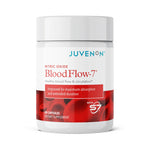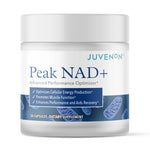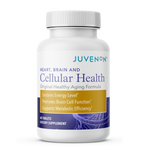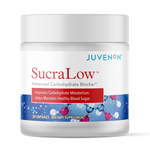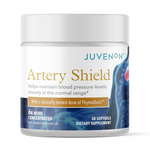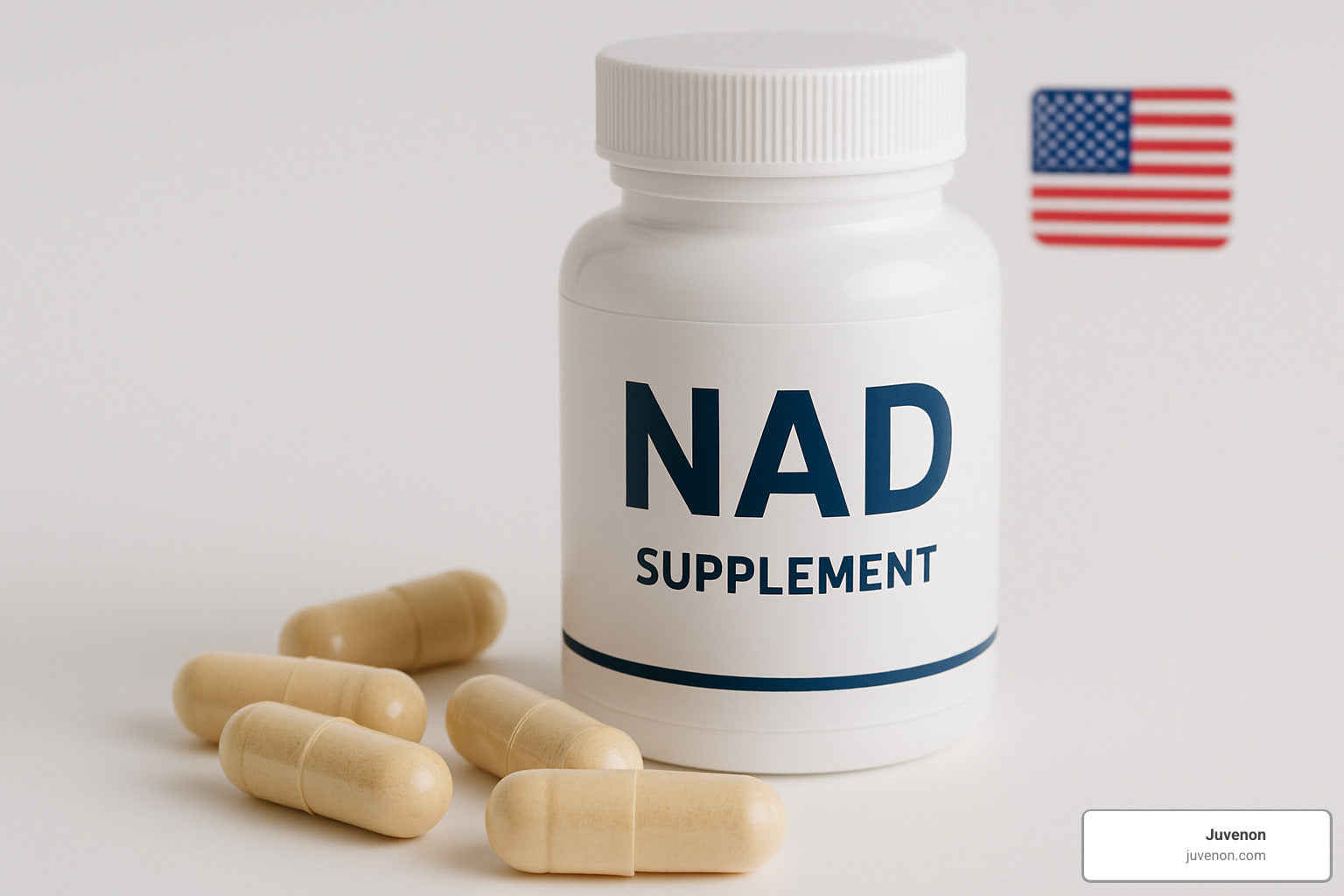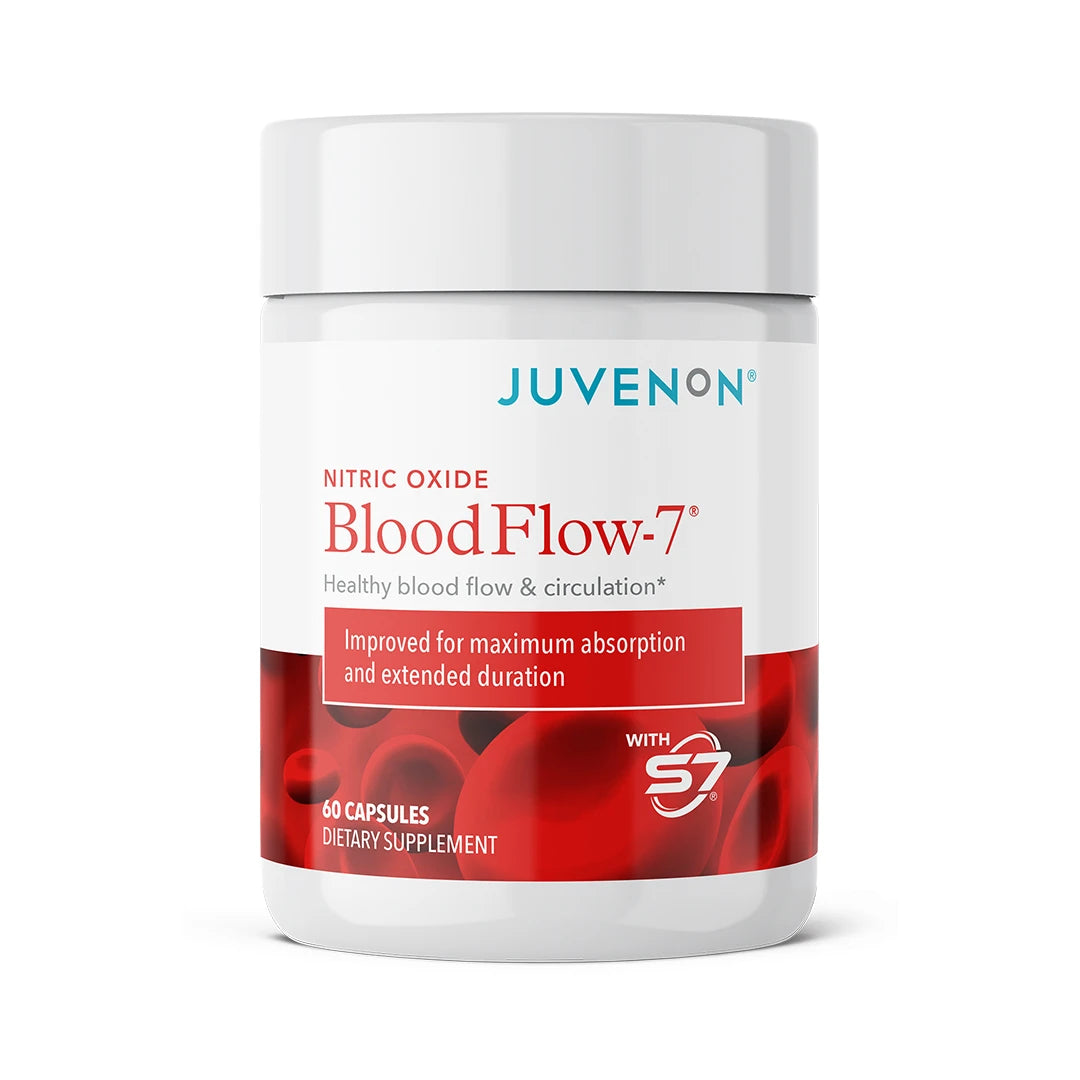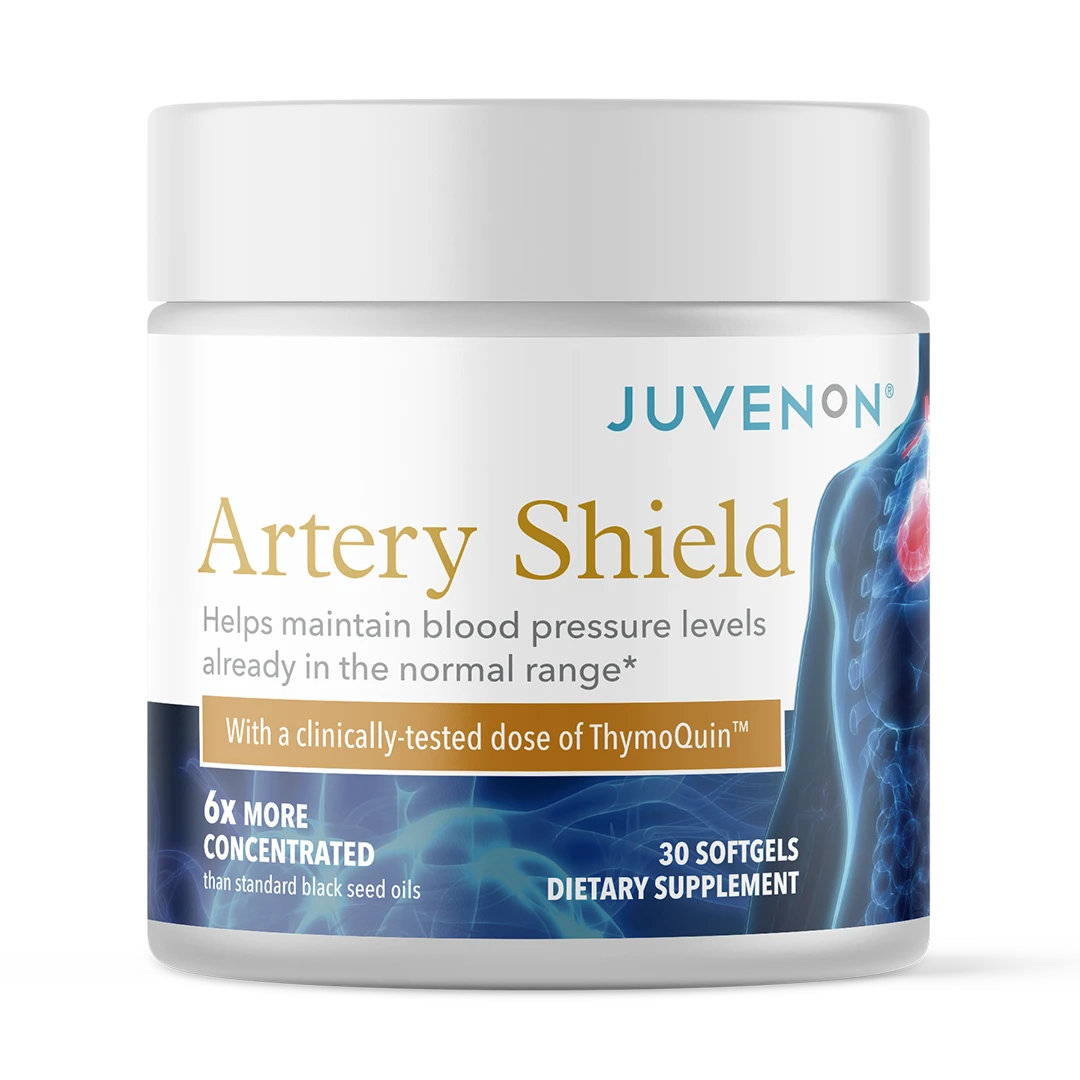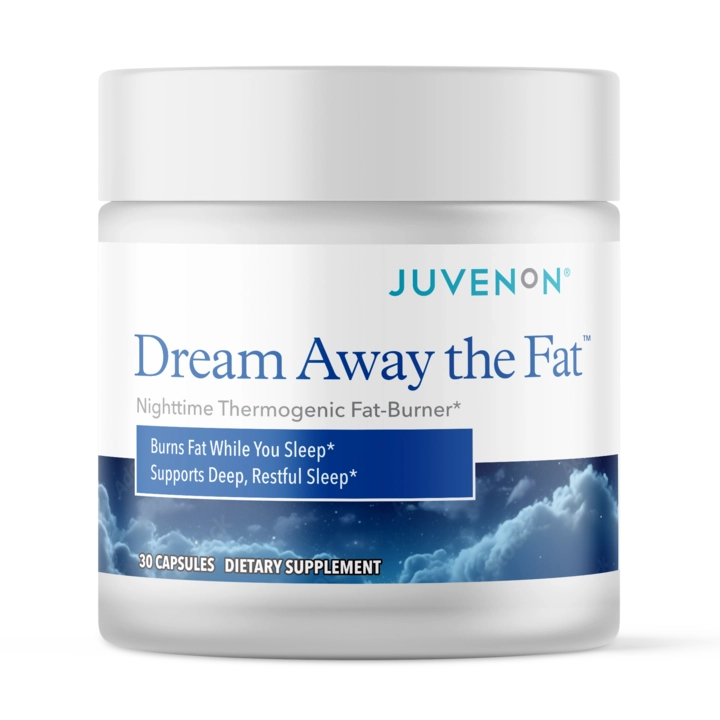How Nitric Oxide and Erectile Dysfunction Are Connected
Nitric oxide and erectile dysfunction have a strong connection because nitric oxide helps blood vessels relax, allowing blood to flow easily into the penis for an erection. When nitric oxide levels are low, erections become difficult or impossible, leading to erectile dysfunction.
Here's the quick breakdown of how nitric oxide impacts erections:
- Relaxes blood vessels so more blood can flow into the penis.
- Triggers chemical reactions that allow penile tissue to fill with blood.
- Maintains erections by keeping blood in the penis throughout intercourse.
When nitric oxide production is impaired, this process breaks down, making nitric oxide deficiency a key factor behind erectile dysfunction, especially as men age or deal with conditions like diabetes and heart disease.
I'm Michelle M. Henson, head copywriter and compliance editor at Juvenon, with over 20 years of experience exploring the science behind vital health supplements and their connection to conditions like nitric oxide and erectile dysfunction. I'll walk you through exactly what's happening and how you can address these concerns.

Understanding Erectile Dysfunction and Its Causes
Erectile dysfunction (ED) isn't just a frustrating inconvenience or something to be brushed aside as a normal part of aging. It's actually a medical condition defined as the persistent inability to achieve and maintain an erection firm enough for satisfying sexual activity. While occasional trouble isn't a huge concern, ongoing issues can significantly impact your quality of life and even your relationships.
Far more common than many people realize, ED affects about 40% of men over the age of 40, and that number climbs steadily as men age. In fact, statistics show the prevalence of erectile dysfunction in men aged 40–70 is around 52%, with complete impotence rising sharply from 5% at age 40 to approximately 15% by age 70. Surprisingly, around one in four men newly diagnosed with ED are actually younger than 40 years old. Clearly, this isn't just a condition that impacts older men alone.
So what's behind ED? According to Dr. Arthur L. Burnett, a leading urologist, erectile dysfunction is "a common, multifactorial disorder" tied to both aging processes and various health conditions—ranging from high blood pressure, high cholesterol, diabetes, and cardiovascular disease to psychological challenges like depression and anxiety.
A crucial connection most people don't realize is how closely nitric oxide and erectile dysfunction are linked. Nitric oxide helps your blood vessels relax, allowing blood to flow freely into the penis. Almost half of patients with ischemic heart disease (a condition linked to clogged arteries) report ED, and in roughly two-thirds of these cases, ED symptoms actually appeared before the heart disease symptoms became noticeable. This makes ED a potential early warning sign for cardiovascular disease, sharing the common underlying issue of nitric oxide deficiency and vascular damage.
If you're dealing with ED, it's important to recognize factors that might increase your risk. Many of these risk factors impact your body's ability to produce or effectively use nitric oxide, highlighting its central role in erectile function.
Risk Factors That Contribute to Erectile Dysfunction
One of the biggest risk factors is aging itself. As you age, your body naturally produces less nitric oxide, making erections harder to achieve. In fact, men aged 50–90 have a ten-times higher risk of ED compared to younger men. But aging alone isn't the whole story.
Your cardiovascular health significantly impacts erectile function. Conditions like high blood pressure (hypertension), clogged arteries (atherosclerosis), and high cholesterol (hypercholesterolemia) all harm the delicate lining of your blood vessels, known as the endothelium. Since the endothelium is responsible for nitric oxide production, damage here can drastically reduce blood flow to the penis, leading directly to ED.
Men with diabetes also face increased risk—three times higher than non-diabetic men—to experience erectile dysfunction. Diabetes affects nitric oxide production through a complex combination of oxidative stress, nerve damage, and endothelial dysfunction.
Lifestyle choices can strongly influence your risk as well. For instance, smoking is notoriously harmful because tobacco damages blood vessels and significantly reduces nitric oxide availability. Research shows smoking just two cigarettes can slash your nitric oxide output by up to 36%!
Obesity, especially around the belly, can lower testosterone levels and increase inflammation in your body, both of which negatively impact nitric oxide production. Staying active matters too—regular exercise stimulates nitric oxide, while a sedentary lifestyle can lead to reduced nitric oxide levels and weaker erections.
Moderation is important when it comes to alcohol. Occasional drinks likely won't cause issues, but heavy drinking (excessive alcohol consumption) can damage your liver, disrupt hormone levels, and impair nitric oxide synthesis.
Certain medications can make ED worse as well. Some antidepressants, blood pressure medications, and even antihistamines may interfere with erections by altering neurotransmitter balance or reducing blood flow.
Don't underestimate psychological factors either. Stress, anxiety, depression, and relationship issues can all worsen ED by triggering stress hormones that constrict your blood vessels and reduce your nitric oxide levels. Additionally, sleep disorders like sleep apnea lower nighttime oxygen levels, which can further impair nitric oxide production.
The good news? Many of these risk factors are things you can change. By improving your lifestyle—eating healthy, exercising, avoiding smoking, and managing stress—you can naturally boost nitric oxide production, helping restore your erectile health and overall well-being.
The Science of Nitric Oxide and Erectile Function

To truly grasp how nitric oxide and erectile dysfunction are connected, let's take a closer look at the remarkable science behind this simple yet incredibly powerful molecule.
Nitric oxide (NO) is a colorless gas molecule that your body naturally produces. Despite its tiny size and simplicity, NO acts as one of your body’s most essential signaling molecules. It's involved in many vital biological functions—from regulating blood pressure to supporting healthy immune function. But one of nitric oxide's most famous roles is its starring performance in erectile function.
In fact, researchers first finded nitric oxide's critical role in erections back in the early 1990s. This findy fundamentally changed how doctors and scientists understand sexual health. According to Dr. Kelvin P. Davies, a leading researcher in urology, "the role of nitric oxide in erectile physiology is well documented. NO activates relaxation of corporal cavernosal smooth muscle tissue resulting in increased blood flow into the penis resulting in an erection."
In other words, nitric oxide is the body's ultimate traffic cop for blood flow. It sends a signal to blood vessels to relax and widen—a process known as vasodilation—which allows more blood to flow freely. Without sufficient NO, this signaling breaks down, contributing directly to erectile dysfunction.
On a molecular level, here's exactly how nitric oxide works its magic:
When you're sexually aroused, nerve impulses travel from your brain and spinal cord down to nerve endings in the penis. These nerve endings quickly release nitric oxide, setting off a chain reaction. Nitric oxide then activates an enzyme known as soluble guanylate cyclase (sGC). This enzyme increases the level of cyclic guanosine monophosphate (cGMP)—and it's this increased cGMP that causes smooth muscle cells inside the penis to relax.
As these smooth muscles relax, blood vessels in your penis rapidly widen, allowing significantly more blood to flow in. This influx of blood fills the spongy erectile tissues (the corpora cavernosa), creating the rigidity needed for a firm erection.
Not only does nitric oxide kickstart the erection, but it also helps maintain it. Initially, nerves release nitric oxide in short bursts to start the erection process. But sustained nitric oxide production from the inner lining of blood vessels (endothelial cells) helps keep the erection firm throughout intercourse. This ongoing release of nitric oxide is controlled by enzymes called nitric oxide synthases (NOS), specifically neuronal NOS (nNOS) and endothelial NOS (eNOS).
Interestingly, humans don't have a penis bone (called a baculum) found in many other mammals. Instead, we rely entirely on this hydraulic mechanism—powered by nitric oxide—to produce erections. In some ways, you can think of healthy erections as a biological "fitness indicator," showing good cardiovascular health and proper nitric oxide signaling.
This nitric oxide-cGMP pathway is so crucial to having and maintaining an erection that it's exactly how popular ED medications like Viagra (sildenafil) work. These medications, called PDE5 inhibitors, block an enzyme that breaks down cGMP, helping nitric oxide's signal stay stronger and last longer.
Research in the Journal of Urology further supports this idea, clearly stating that impaired nitric oxide activity is a primary cause of erectile dysfunction. It's no exaggeration to say that nitric oxide has revolutionized our understanding and treatment of sexual health.
How Nitric Oxide Facilitates Penile Erection
Achieving and maintaining an erection is a surprisingly complex dance between nerves, blood vessels, and hormones—and nitric oxide is the one molecule orchestrating the whole show.
When you experience sexual arousal, your brain quickly sends signals down your spinal cord to nerves around your pelvic area. These nerves, known as nitrergic nerves, respond by releasing nitric oxide directly into your penile tissues.
Nitric oxide then travels into the smooth muscle cells within the penis, activating the cGMP pathway we mentioned earlier. This causes those muscles to relax, making room for increased blood flow into the penis. It's kind of like opening the floodgates—blood rushes into the erectile tissue, rapidly filling it and making your penis firm.
As the penis fills with blood, the erectile tissues expand against the firm outer layer, the tunica albuginea. This pressure squeezes shut the veins that usually carry blood away from the penis. With nowhere to escape, blood stays trapped, keeping the erection firm and stable. (Nature’s clever way of preventing "performance interruptions!")
But nitric oxide's job isn't finished yet. To sustain this erection, your body continuously produces nitric oxide from endothelial cells lining the blood vessels. This ongoing process ensures blood flow stays strong and consistent throughout sexual activity.
Interestingly, increased blood flow also raises oxygen levels in penile tissues. This higher oxygen level helps boost nitric oxide production further, creating a positive feedback loop that makes your erection steady and reliable. Basically, the better your nitric oxide production, the stronger and healthier your erections will be.
Here's the key takeaway: nitric oxide and erectile dysfunction are directly linked because adequate nitric oxide is essential for every step in the erection process. If your body struggles to produce or use nitric oxide effectively, achieving or maintaining an erection can become difficult.
Understanding this connection makes it clear why boosting nitric oxide naturally—through diet, exercise, and scientifically-backed nutritional supplements like those offered by Juvenon—can be such a game-changer for improving your sexual health.
The Connection Between Nitric Oxide and Erectile Dysfunction
When it comes to understanding the link between nitric oxide and erectile dysfunction, it's helpful to picture nitric oxide as the body's friendly messenger. Its job is to let your blood vessels know it's time to loosen up, allowing increased blood flow exactly when and where you need it most—especially in achieving a healthy erection.
But here's the catch: when nitric oxide production or signaling goes awry, the entire erection process can stall out. In fact, research has clearly established impaired nitric oxide bioactivity as one of the major underlying reasons why erectile dysfunction (ED) develops in the first place. According to a study published in the Journal of Urology, "Impaired NO bioactivity is a major pathogenic mechanism of erectile dysfunction."
Several key factors can cause nitric oxide levels to drop, leaving men struggling with ED:
Endothelial Dysfunction is one major culprit. The endothelium, or the inner lining of your blood vessels, is a major producer of nitric oxide within the penis. When the endothelium is damaged—often by conditions such as hypertension, diabetes, or high cholesterol—its nitric oxide output falls dramatically. This explains why erectile dysfunction and cardiovascular disease often show up together: both conditions share this underlying endothelial damage.
Another villain here is Oxidative Stress. Think of oxidative stress as the body's rust, caused by too many free radicals roaming around. These free radicals—resulting from smoking, poor diet, or environmental toxins—rapidly break down nitric oxide before it can do its job. Over time, oxidative stress not only reduces the availability of nitric oxide but also harms the very endothelial cells that produce it.
Sometimes, the problem is as simple as having Decreased Enzyme Activity. The special enzymes responsible for creating nitric oxide (nitric oxide synthases, or NOS) naturally decline as you age, or they become less effective due to hormonal shifts or medical conditions. Animal studies have shown that aging alone can significantly reduce nitric oxide synthesis, making erections more difficult.
Not having enough building blocks for nitric oxide can also lead to trouble. Nitric oxide is synthesized from the amino acid L-arginine, and if your body doesn't have enough of it, nitric oxide production will suffer. This is why supplements containing L-arginine or its precursor, L-citrulline, can sometimes help improve erectile function.
Finally, Neurological Factors can be a significant issue. Damage to nerves from diabetes, spinal injuries, or prostate surgeries disrupts the nerve signals that trigger nitric oxide release. Unfortunately, when nerves are seriously impaired, common ED treatments like PDE5 inhibitors (such as Viagra) might not be as effective, since these medications depend on healthy nerve signals to work their magic.
Speaking of PDE5 inhibitors, their success in treating ED further confirms the nitric oxide connection. Drugs like sildenafil (Viagra) work by preventing cGMP—the messenger that nitric oxide activates—from breaking down. This allows your body's natural nitric oxide signals to last longer, promoting better erections.
The fascinating thing about ED is that it can serve as an early warning sign for potential cardiovascular issues. Both ED and cardiovascular disease stem from the same root cause: impaired nitric oxide bioactivity. As nitric oxide expert Dr. Nathan Bryan explains, "Erectile difficulties typically precede the increase in blood pressure and should serve as an ominous sign of potential worse problems to come."
Understanding this important connection makes it clear that addressing nitric oxide deficiency not only improves your sexual health but also supports overall cardiovascular wellness.

Common Conditions That Impair Nitric Oxide Production
A variety of common health conditions and lifestyle factors can significantly lower your body's nitric oxide levels, making it tough to maintain healthy erections.
For example, Diabetes Mellitus is a big player here. Diabetic men are far more likely to experience ED, with estimates showing between 27% and 75% of diabetic men affected. Diabetes impacts nitric oxide through several pathways, including increased oxidative stress, insulin resistance, and damage to the endothelium.
Hypertension (high blood pressure) is another common condition that damages your blood vessels, making it harder to produce nitric oxide. Nearly half of men with ED have hypertension, compared to less than 20% of men without erection issues. Chronic high blood pressure can stiffen arteries, increase harmful reactive oxygen species, and ultimately lower nitric oxide levels.
If you have high cholesterol (Hypercholesterolemia), excess LDL cholesterol can damage endothelial cells, limit NO-producing enzymes, and reduce nitric oxide overall. It also increases a harmful substance called asymmetric dimethylarginine (ADMA), which directly blocks nitric oxide production.
Metabolic Syndrome—a cluster of obesity, high blood sugar, high blood pressure, and cholesterol issues—is basically a "perfect storm," creating inflammation and oxidative stress that significantly lower nitric oxide availability.
Arterial plaque (Atherosclerosis) physically blocks blood flow, harming the very cells responsible for nitric oxide production. As plaque builds up, erectile function often diminishes as blood flow becomes increasingly restricted.
Then there's good old-fashioned Aging. As we age, our bodies naturally produce less nitric oxide due to reduced enzyme activity, increased oxidative stress, and fewer essential nutrients. Unfortunately, age-related nitric oxide decline can mean that getting an erection isn't as simple as it used to be.
Androgen deficiency (low testosterone levels) also significantly impacts nitric oxide. Testosterone helps regulate nitric oxide synthase—the enzyme responsible for creating nitric oxide—and low testosterone levels can mean less nitric oxide production. Studies in animals show that testosterone replacement can restore erectile function by boosting nitric oxide enzymes.
Last but not least, conditions involving Chronic Inflammation—like autoimmune diseases, chronic infections, and obesity—cause inflammatory chemicals to disrupt endothelial function, reducing nitric oxide levels even further.
By understanding how these common conditions negatively affect nitric oxide production, you can take action to address them directly. Improving nitric oxide not only supports better sexual health but also helps safeguard overall heart health—truly a win-win scenario.
Natural Ways to Boost Nitric Oxide for Better Erectile Function
If you're looking to improve your erectile function naturally, boosting your body's nitric oxide production should be at the top of your list. Thankfully, there are several enjoyable and effective ways to gently nudge your body's own nitric oxide levels upward. These methods either provide the raw materials your body needs or create a healthy environment for optimal nitric oxide production.
Dietary Sources of Nitric Oxide Precursors
One of the tastiest ways to tackle nitric oxide and erectile dysfunction is by eating foods that naturally boost nitric oxide production.
Leafy greens like arugula, spinach, kale, and Swiss chard are packed with dietary nitrates, which your body converts into nitric oxide. Arugula is a superstar here, boasting the highest nitrate content among greens. Aim to enjoy one or two servings daily—think salads, smoothies, or sautéed sides.
If salads aren't your favorite, beets provide another delicious solution. Beetroot is exceptionally high in nitrates, and studies show that beet juice measurably increases nitric oxide levels within hours. Try adding roasted beets to your meals or sipping on fresh beetroot juice a few times a week.
Craving something sweeter? Watermelon is nature's richest source of the amino acid L-citrulline, the precursor to nitric oxide-building L-arginine. Even better news—the rind has even more L-citrulline, so blend it into your smoothies for an extra boost!
For antioxidant support, pomegranate is an all-star. It not only protects nitric oxide from damage but also encourages your body to keep producing more. A small glass of pure pomegranate juice or a handful of seeds makes a refreshing daily snack.
Don't forget healthy snacks like nuts and seeds. Almonds, walnuts, Brazil nuts, pumpkin seeds, and sunflower seeds provide plenty of L-arginine—perfect for supporting nitric oxide creation. Keep a small handful handy throughout the day.
Treat yourself to some dark chocolate (at least 70% cocoa content) daily to boost nitric oxide naturally. Cocoa flavanols improve nitric oxide production, showing science-backed benefits for improved circulation—plus, it's delicious!
Spice lovers rejoice—garlic and onions contain compounds that activate nitric oxide pathways, along with antioxidants that keep your nitric oxide safe. Incorporate these flavorful veggies generously in your daily cooking.
Finally, a drizzle of extra-virgin olive oil or an occasional glass of red wine (in moderation) can further improve nitric oxide production. They're rich in polyphenols and resveratrol, respectively, both beneficial for your vascular function.
By regularly filling your plate with these delicious nitric oxide boosters, you'll give your body the nutrients it craves to support erectile function naturally.

Exercise and Lifestyle Changes That Improve Nitric Oxide
Eating right is essential, but pairing great nutrition with the right lifestyle habits can seriously amplify your nitric oxide production.
Let's start moving! Aerobic exercise—walking, cycling, swimming, or dancing—does wonders for nitric oxide production. Exercise creates gentle stress on your blood vessels, signaling your body to ramp up nitric oxide synthesis. Just 30 minutes of moderate-intensity activity most days can make a noticeable difference.
For extra benefits, add some strength training into your weekly routine. Building muscle doesn't just help you look and feel great; it also boosts hormones like testosterone, which stimulate nitric oxide pathways.
If you're short on time, consider high-intensity interval training (HIIT). It involves short bursts of intense activity, followed by rest periods. This method rapidly boosts nitric oxide and helps improve your cardiovascular health quickly. Just one or two short HIIT sessions each week can be enough to reap significant benefits.
Don't underestimate the power of rest and relaxation. Chronic stress can dramatically reduce nitric oxide production, worsening nitric oxide and erectile dysfunction. Simple relaxation methods like meditation, yoga, or even deep breathing exercises help calm stress hormones, enhancing nitric oxide availability.
Sleep isn't just a luxury—it’s crucial for healthy nitric oxide levels. Aim for a good night's sleep (7-9 hours), and talk to a healthcare provider if you suspect conditions like sleep apnea, which can severely hurt your nitric oxide production and erectile function.
If you're carrying extra pounds, taking small, sustainable steps toward weight management can significantly boost nitric oxide. Even modest weight loss (around 5-10% of your body weight) can markedly improve nitric oxide production and erectile health.
Smoking is a significant enemy of nitric oxide. If you smoke, quitting is one of the single best moves you can make for your erectile function. Your nitric oxide production improves dramatically within weeks of quitting, leading to healthier vessels and better erections.
Lastly, keep an eye on your alcohol consumption. While moderate drinking (1-2 drinks daily) usually isn't harmful, excessive alcohol intake can impair nitric oxide production. Consider occasional alcohol-free days to maintain healthy nitric oxide function.
By thoughtfully combining these dietary and lifestyle strategies, you'll naturally support your body's nitric oxide production, tackling the root causes of nitric oxide and erectile dysfunction. Not only will this help improve your erectile function, but you'll also enjoy better overall health, vitality, and quality of life.
Supplements and Medications That Target Nitric Oxide Pathways
If you're looking for additional support beyond lifestyle changes to tackle concerns around nitric oxide and erectile dysfunction, there are several effective supplements and medications available. Some are over-the-counter solutions, while others require prescriptions. Let's explore how each option works and what you can expect from them.
L-Arginine and L-Citrulline Supplements
L-arginine and L-citrulline are two amino acids popular for their role in boosting nitric oxide production naturally. Your body uses L-arginine as a direct building block to make nitric oxide. When there's not enough L-arginine around, nitric oxide production can decline, making it harder to achieve or maintain erections.
L-arginine supplements offer a straightforward way to boost nitric oxide. Typical dosages range from 1,500 mg to 5,000 mg daily. Clinical studies have found that L-arginine can significantly improve erectile function, especially for men experiencing mild-to-moderate ED symptoms. It usually takes around 2 to 4 weeks to notice positive changes.
However, L-arginine isn't perfect for everyone. A lot of it gets broken down by the liver before reaching your bloodstream. Plus, some men experience stomach upset at higher doses. If you're prone to herpes outbreaks, L-arginine might trigger flare-ups, so it's best to avoid it.
This is where L-citrulline comes into play. When you take L-citrulline, your kidneys convert it directly into L-arginine, bypassing liver breakdown. This means you get higher, steadier arginine levels, often resulting in better nitric oxide production. In fact, a 2011 study found men taking L-citrulline saw improvements in erection hardness after just one month. Typical dosages are between 1,500 mg and 3,000 mg daily, and it's generally gentler on your stomach.
Also, combining these amino acids with antioxidants can further improve nitric oxide availability—vitamins C and E, alpha-lipoic acid, and coenzyme Q10 are all excellent choices.
PDE5 Inhibitors and Their Relationship with Nitric Oxide
Perhaps you're already familiar with PDE5 inhibitors like Sildenafil (Viagra), Tadalafil (Cialis), Vardenafil (Levitra), and Avanafil (Stendra). These medications have transformed ED treatment for millions of men, and they work specifically by enhancing the nitric oxide pathway.
Here's how they fit into the picture: When you're sexually aroused, nitric oxide signals blood vessels in the penis to relax, allowing increased blood flow and a firm erection. This process relies on a signaling molecule called cGMP, which is naturally broken down by an enzyme called PDE5. PDE5 inhibitors block this enzyme, allowing cGMP—and the erection—to last longer.
Sildenafil (Viagra) remains one of the most popular options, typically taken about 30-60 minutes before intimacy, lasting about 4-6 hours. Tadalafil (Cialis) offers a longer window of effectiveness—up to 36 hours—making it easier to be spontaneous. Meanwhile, Vardenafil (Levitra) has a similar profile to Sildenafil, and Avanafil (Stendra) acts even faster, sometimes within just 15 minutes.
PDE5 inhibitors don't directly cause erections; they still require sexual stimulation to trigger nitric oxide release. They're effective for about 80% of men, especially in mild-to-moderate ED scenarios. However, they're often less effective when there's severe nerve or vascular damage affecting nitric oxide production.
It's crucial to know that PDE5 inhibitors shouldn't be taken with nitrate medications (like nitroglycerin), as this combination can dangerously lower blood pressure. Always check with your healthcare provider if you're unsure.
Antioxidant Supplements to Protect Nitric Oxide
Another layer of defense for your nitric oxide levels comes from antioxidants. These supplements don't directly boost nitric oxide production, but they protect the nitric oxide your body already makes. Vitamin C, vitamin E, Coenzyme Q10, and alpha-lipoic acid help neutralize harmful free radicals that otherwise degrade nitric oxide. Think of antioxidants as nitric oxide's bodyguards, keeping it around longer so it can do its job.
Other Promising Supplements Worth Exploring
Several other supplements can support nitric oxide pathways. French maritime pine bark extract (Pycnogenol) has shown impressive results, especially when combined with L-arginine—one study saw over 90% of men experience significantly improved erections. Beetroot supplements are also gaining attention because they're naturally high in nitrates, which your body converts directly into nitric oxide. Similarly, pomegranate extracts provide powerful antioxidant support, protecting nitric oxide from oxidative damage and improving endothelial function.
Combining Supplements and Medications Wisely
Sometimes, the best results come from combining these approaches. For example, using PDE5 inhibitors alongside L-arginine or L-citrulline supplements may improve effectiveness. However, combining medications and supplements should always be done cautiously and under medical supervision to avoid interactions.
The pathway connecting nitric oxide and erectile dysfunction offers multiple avenues to pursue—whether you're seeking prescription medications, natural supplements, or a thoughtful combination. Before starting any new supplement or medication regimen, especially if you have chronic conditions or take other medications, it's smart to consult with your healthcare professional. This ensures you find the safest and most effective approach custom just for you.
Advanced Treatments Targeting Nitric Oxide for Erectile Dysfunction
If you've tried conventional treatments for erectile dysfunction (ED) without much success, don't lose heart—science is continually advancing, and exciting new treatments are emerging that specifically address issues with nitric oxide and erectile dysfunction. These cutting-edge approaches aim to restore nitric oxide pathways in novel ways, offering renewed hope for men struggling with ED.
Gene Therapy to Increase NOS Expression
One fascinating area of research focuses on gene therapy, a technique designed to boost the production of nitric oxide synthase (NOS)—the enzyme responsible for creating nitric oxide in your body. Animal studies have shown remarkable results, with researchers successfully using adenovirus vectors to deliver genes that increase NOS activity directly into penile tissue.
For example, studies with diabetic and older rats who had severe ED showed significant improvements in erection quality after this gene therapy. While still experimental and not yet widely available, gene therapy holds immense promise—especially for men who don't respond to standard medications.
As scientists have pointed out, while there are ethical problems to overcome, gene therapy could eventually be a breakthrough for those with treatment-resistant ED, directly restoring the body's natural nitric oxide production.
Nitric Oxide Donors
When your body just can't produce enough nitric oxide naturally, nitric oxide donors could step in to help. These compounds release nitric oxide directly into penile tissues—bypassing damaged enzyme pathways entirely.
Nitric oxide donors like nitroglycerin have long been used for heart conditions, but newer, more stable formulations specifically designed for ED are now being tested. These advanced compounds could be particularly helpful for men whose nitric oxide pathways are severely damaged, such as those with significant diabetes or nerve injury.
The key challenge with nitric oxide donors? Balancing just the right dosage to avoid dropping blood pressure too low. But researchers are optimistic that carefully engineered formulas could offer targeted relief without unwanted side effects.
Soluble Guanylate Cyclase (sGC) Activators
Another promising class of treatments involves soluble guanylate cyclase (sGC) activators. Normally, nitric oxide activates sGC, which then produces cGMP—the molecule responsible for relaxing penile blood vessels. But when nitric oxide levels are too low, sGC activators step in and stimulate cGMP production directly, even without much nitric oxide around.
These compounds have already proven helpful in treating pulmonary hypertension, and they're now being studied for ED. If successful, sGC activators could provide a new option for men who aren't helped by PDE5 inhibitors like Viagra.
Combination Therapies
Sometimes, the best approach is a carefully crafted combination of treatments. Specialists today are increasingly combining PDE5 inhibitors with other therapies, such as vacuum erection devices or injectable medications like alprostadil and papaverine. In studies, these combination therapies have achieved success rates of over 90%!
By using more than one approach at once—especially when nitric oxide pathways are compromised—you maximize your chances of restoring healthy erectile function.
Stem Cell Therapy
Stem cell treatments are generating exciting buzz thanks to their regenerative potential. Early research shows that mesenchymal stem cells, injected directly into penile tissues, can regenerate damaged nerves and blood vessels. These revitalized tissues then start producing nitric oxide again, naturally.
Animal studies have already demonstrated impressive results, and initial human trials look promising. While it’s still too early for widespread clinical adoption, stem cell therapy could someday offer lasting improvements—rather than simply temporarily easing symptoms.
Shockwave Therapy
Low-intensity shockwave therapy (LI-ESWT) is gaining traction as a non-invasive treatment for ED. It may sound intimidating, but it's actually gentle acoustic waves that stimulate blood vessel growth and nitric oxide production in penile tissues.
Men with ED caused by poor blood flow (vasculogenic ED) often see improvements following shockwave therapy—even if PDE5 inhibitors previously didn’t help. Many men report they respond better to medications after undergoing shockwave sessions.
Personalized Medicine Approaches
The future of ED treatment could be personalized medicine—custom specifically to your unique biology. Researchers are exploring genetic testing, biomarker assessments, and precision protocols based on individual patient profiles.
Imagine treatments specifically designed based on your nitric oxide pathways and genetic makeup. Personalized medicine could significantly improve treatment effectiveness, offering hope where standard therapies fall short.
Nitric Oxide Releasing Materials and Novel Delivery Systems
Imagine if treating ED was as simple as applying a cream or wearing a discreet patch. Innovations in nitric oxide delivery systems are making this exciting possibility a reality.
One promising advancement involves nitric oxide-releasing nanoparticles (NO-nps). These tiny particles store nitric oxide and release it slowly, directly into penile tissue. Animal studies with topical NO nanoparticles showed spontaneous erections and significantly improved penile blood flow. Because they're applied locally, these nanoparticles don't cause significant systemic side effects—making them especially exciting for neurogenic ED patients who struggle to benefit from oral medications.
Scientists are also experimenting with topical gels and creams containing nitric oxide precursors. These convenient, easy-to-use formulas release nitric oxide directly into the penile tissue, bypassing compromised pathways and ensuring immediate local effects.
Another innovative option is using biodegradable polymers designed to provide controlled, sustained release of nitric oxide. These could take the form of implants or injections, gradually delivering nitric oxide over days or even weeks—meaning fewer treatments and more convenience for patients.
Researchers have also developed sophisticated transdermal patches, which gently release nitric oxide through the skin over several hours, allowing discreet, consistent treatment and minimizing side effects.
For tougher-to-treat ED, specialists sometimes use intracavernosal injections (directly into penile tissue). While injections might sound intimidating, new microneedle technologies and longer-lasting formulations have made this method safer, easier, and far more comfortable.
Finally, innovative hydrogel-based systems could offer injections that quickly form a gel in the target area, releasing nitric oxide gradually and consistently—without affecting the rest of your body.
Many of these advanced nitric oxide delivery systems are still being tested, with some already available through specialized clinics and compounding pharmacies. As these technologies advance, they could offer powerful, targeted solutions—especially helpful to men who haven't responded well to traditional treatments.
As one researcher noted about these promising innovations: "Because nitric oxide-releasing materials act upstream in nitric oxide pathways, combining them with PDE5 inhibitors could someday provide a powerful synergistic effect."
Together, these advanced treatments and novel delivery methods represent an exciting and hopeful frontier in addressing nitric oxide and erectile dysfunction—offering fresh solutions and personalized options for men everywhere.
Frequently Asked Questions about Nitric Oxide and Erectile Dysfunction
Can Nitric Oxide Supplements Completely Cure Erectile Dysfunction?
We get this question a lot, and it's clear why. When dealing with something as personal as nitric oxide and erectile dysfunction, everyone hopes for a straightforward solution. But the truth is a bit nuanced.
Nitric oxide supplements aren't usually considered a total "cure" for ED, especially if the underlying conditions aren't addressed. But here's the good news: they can make a big difference for many men, particularly if your ED stems from nitric oxide deficiency, mild vascular issues, dietary gaps, or lifestyle factors.
Your results depend largely on why you're dealing with ED. If your condition is mild to moderate and linked to factors like poor nutrition, lack of exercise, or early-stage vascular issues—nitric oxide supplements can really help. But if your ED is due to more serious nerve damage, severe vascular problems, significant hormonal imbalances, or psychological issues, supplements alone probably won't be enough.
Another key factor is the type and quality of supplement you choose. For example, L-citrulline typically works better than L-arginine because it's absorbed more effectively and stays active in your bloodstream longer. And combination supplements, like L-arginine with pine bark extract, have shown even more encouraging results in studies.
Everyone responds differently. A study in 2011 found that about half of men with mild ED noticed improved erection firmness after taking L-citrulline for a month. So, while some men experience dramatic improvements, others see more modest results.
Rather than thinking of nitric oxide supplements as a quick fix or permanent cure, view them as part of a comprehensive strategy. Pairing supplements with lifestyle improvements, dietary changes, and medication (when appropriate) generally provides the best long-term results.
Is It Safe to Take Nitric Oxide Supplements with Other ED Medications?
Safety always comes first, especially when combining supplements with medications. When it comes to mixing nitric oxide supplements with other ED treatments, caution and clear communication with your healthcare provider are essential.
If you're currently using PDE5 inhibitors like Viagra, Cialis, Levitra, or Stendra, talk to your doctor before adding nitric oxide boosters. While some men safely combine them under medical supervision, it can amplify the blood-pressure-lowering effects, increasing the risk of dizziness or fainting. Usually, your doctor can help you start at lower doses and monitor your response.
However, one combination you must absolutely avoid is taking nitric oxide supplements alongside nitrate medications (like nitroglycerin or isosorbide). Both nitric oxide supplements and nitrates widen blood vessels and lower blood pressure, and using them together can lead to dangerously low blood pressure, triggering fainting, heart attacks, or strokes.
If you're using injectable ED treatments like alprostadil, there's less known risk of interaction, but it's still wise to consult your doctor first. Keeping your healthcare provider informed about all your supplements and medications ensures the safest and most effective approach.
Always pay attention to your body's signals when combining treatments. If you experience dizziness, nausea, chest pain, or any concerning symptoms, seek medical help immediately.
How Long Does It Take for Nitric Oxide Boosters to Improve Erectile Function?
We understand: when you're dealing with something as frustrating as erectile dysfunction, waiting feels like forever. You want to know exactly when you'll see results from nitric oxide boosters.
Here's the honest scoop—it varies. The timing depends heavily on the supplement you're using, your overall health, and what's causing your ED.
Dietary sources like beetroot or leafy greens can boost nitric oxide levels within just a few hours after eating. However, noticeable improvements in erectile function often take consistent dietary changes over one to two weeks.
With supplements like L-arginine, your body starts increasing nitric oxide shortly after ingestion, but meaningful improvements in your erections typically emerge after two to eight weeks of consistent daily use. L-citrulline usually takes about four weeks of regular supplementation before improvements are noticeable, although some men feel benefits sooner.
Combination supplements, such as L-arginine plus pine bark extract, have shown improvements in clinical trials within one to three months of consistent use.
Lifestyle changes also show varying timelines. Regular aerobic and resistance exercise often produces noticeable improvements in erectile function after about four to twelve weeks of commitment. Similarly, quitting smoking, managing stress, and adopting a healthy Mediterranean-style diet can lead to noticeable improvements in erectile health within a few months.
The key to seeing quicker, more sustainable results is consistency. Using nitric oxide boosters sporadically typically yields minimal benefits. When you combine regular supplement use with lifestyle improvements, the results tend to be faster and more pronounced.
While nitric oxide boosters don't typically provide an instant fix like certain prescription medications, they're worth the patience. Over time, addressing the underlying issues behind ED with nitric oxide supplements and lifestyle changes can lead to lasting improvements—not just for your erections, but for your overall health and well-being too.
Conclusion
We've covered a lot of ground together exploring the powerful connection between nitric oxide and erectile dysfunction, and by now, you've likely seen how this tiny molecule can have a huge impact on your sexual health.
Nitric oxide isn't just some random chemical—it's the key player in getting and maintaining healthy erections. It signals your blood vessels to relax and open wide, helping blood flow exactly where it's needed. When nitric oxide isn't available in sufficient amounts, blood flow slows down, and erection troubles can pop up. (Sorry, couldn't resist!)
But here's the good news—many things that impair nitric oxide production are under your control. Aging, cardiovascular disease, diabetes, smoking, and a sedentary lifestyle can all chip away at your body's nitric oxide levels. By taking proactive steps—like staying active, eating a diet rich in nitric oxide precursors, managing stress, and getting good sleep—you can naturally boost nitric oxide. These lifestyle changes can go a long way toward improving erectile function and overall health.
Of course, everyone's body reacts differently. Supplements like L-arginine, L-citrulline, and PDE5 inhibitors can be helpful, but the response can vary from person to person. For some, these supplements make a noticeable difference quickly; for others, it may take some patience and trial and error to find what works best.
Another important takeaway is that erectile dysfunction may actually be an early warning sign of broader cardiovascular issues. Since erectile function and heart health both rely heavily on the nitric oxide pathway, taking steps to improve your nitric oxide production can benefit not only your sexual health but also your overall cardiovascular well-being.
At Juvenon, we deeply understand the importance of nitric oxide for a healthy, vibrant life. Our scientifically backed health supplements are specially crafted to support your body's natural nitric oxide production and vascular function. We pride ourselves on patented formulas, backed by research, and we confidently offer a 60-day money-back guarantee.
While supplements and lifestyle changes can be incredible tools, we always recommend talking to a healthcare provider about your concerns. This is especially important if you're already taking medications or dealing with underlying health conditions. (Better safe than sorry!)
By taking an informed, proactive approach, you can optimize your nitric oxide pathways—and many men experience real improvements in their sexual vitality and overall confidence. Whether you're dealing with occasional hiccups (we've all been there!) or more persistent issues, addressing nitric oxide and erectile dysfunction is a smart and empowering step toward improved sexual and overall health.
Ready to take the next step toward better nitric oxide production and healthy aging? Check out Juvenon's natural supplements and find how we can support you in your health journey.


